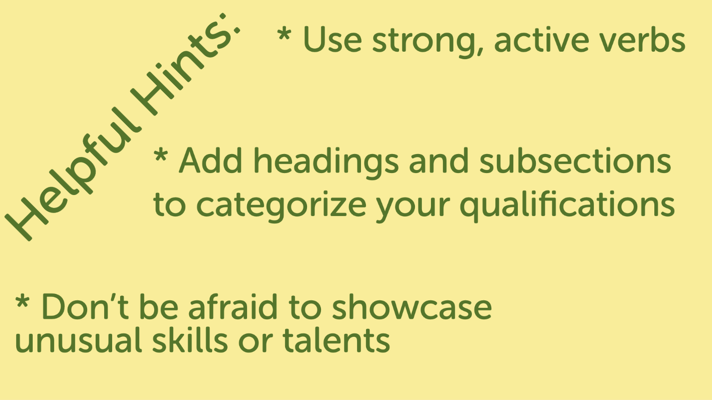This post was written by Clay Thompson, an undergraduate consultant at the UWC.
As a senior Baylor student on the cusp of a December graduation (all fingers crossed), not only am I stressing for the fall, with the finals, the papers, and of course, the cold, what chills me to the bone the most is finding a job after college. Don’t get me wrong, I’ll be double majoring in Journalism and English, but as a student, and a writer, I oftentimes run into issues with writing my résumé and CV. However, working at the Writing Center for a few years now has given me really great information and advice and tips distinguishing résumés and CVs, as well as how to write them so that employers will definitely throw their attention your way.
Firstly, let’s go over the key differences between what a résumé is and what a CV is:
Résumés:
- Résumés are typically more formal documents that condense your education, work history, skills, achievements, etc., into bite sized chunks so that employers can scan over your qualifications for a variety of job types and fields.
- Résumés start with an optional short paragraph summarizing, not in the first person, your skills strengths and qualifications depending on the job you are going for.
- There are several widely accepted formats for a résumé to be in (functional format, chronological format, combination format, etc.).
CVs:
- CVs typically are a much more detailed and comprehensive documentation of your work history.
- You would also likely include relevant research, teaching, publications, relevant hobbies and interests etcetera, that would showcase how qualified and unique you are for the job you’re applying for.
- CVs are usually only required to apply for jobs in an academic, medical or legal field, while résumés can be used to apply for any kind of job.
Essentially, CVs don’t have a specific format or length requirement of what you need to include or show to submit for a job application, whereas résumés do have formatting and specific sections required. However, résumés can be used for any job, while CVs are reserved for use typically in a few specific fields or industries.

Tips and Tricks for Writing a Well-Written Résumé or CV
While there are major differences in what might be included in a résumé or CV, there are certainly some universal writing tips and tricks that can be utilized to grab potential employers’ attention to your qualifications.
- Use strong, active verbs: Especially when describing your job experience. Employers not only want to see where you worked and what you did, but how you did it. If you worked as a librarian and re-shelved books, you “took initiative to re-shelve books at every half hour”. By using strong, active verbs such as “adapted, advised, coached, developed, etc.”, it not only shows employers you took your work seriously, but that you enjoyed the work as well.
- Be sure to add headings and subsections to categorize your qualifications: CVs and résumés alike can both contain lots of information about you and your experience. That being said, taking time to create bolded headings and subsections of your education, skills, work experience and other factors depending on the job will show employers that you are organizational and recognize what they are looking for in a viable job candidate.
- Don’t be afraid to showcase unusual skills or talents: If you feel they are relevant or can be to a job you’re applying for, then don’t be afraid to show off your stranger bits of experience and skills. Whether they are unorthodox jobs or unusual talents, showing what you specifically and uniquely bring to the table, other than just the usual leadership, adaptability, teamwork, blah blah blah, will be sure to catch employers’ eyes.

So, whether you’ve got a CV or résumé to write, hopefully these key differences and tips can help you to avoid stress and write some of the best gosh darn job applications out there. If you still have questions or concerns however, drop by the Writing Center! We don’t only help Baylor students with assignments and papers, but any and all kinds of writing. Remember, these documents are going to be read by strangers, not just your parents, so having a Writing Center consultant be an outsider reader and provide you constructive feedback will be extremely helpful. So come on down and schedule an appointment today!
CV and Résumé Differences Sourced from myperfectresume.com. Links to MyPerfectResume are provided for information only; Baylor UWC is not affiliated with this site in any way.